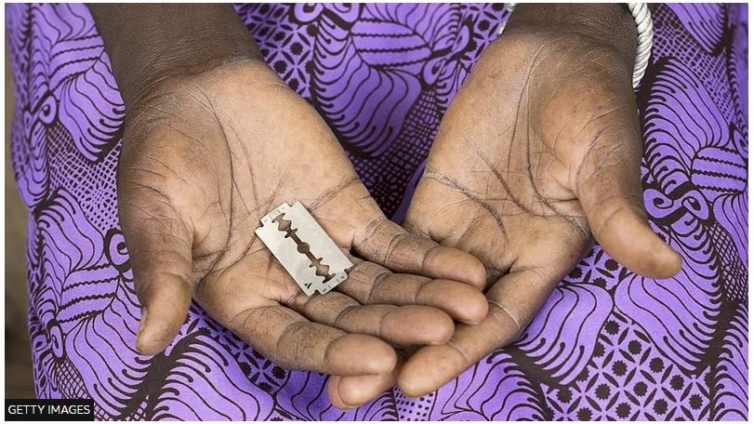A bill aimed at lifting the ban on female genital mutilation (FGM) has been tabled in The Gambia's parliament by an independent lawmaker.
It was outlawed in the mainly Muslim nation in 2015 when Yahya Jammeh was president.
He said it was not required in Islam.
But influential Muslim clerics have been pushing for the ban to be repealed, while women's rights activists have vowed to campaign for it to remain in place.
Mr Jammeh's 22-year authoritarian rule came to an end in 2016.
More than three-quarters of Gambian females aged between 15 and 49 have undergone FGM, according to the UN.
In the procedure's most severe form, after removing the sensitive clitoris, the genitals are cut and stitched closed so that the woman cannot have or enjoy sex.
Followers of an outspoken Muslim cleric, Abdoulie Fatty, rallied in support of the bill shortly before it was introduced in parliament on Monday.
They chanted: "Female circumcision is my religious belief, Gambia is not for sale."
Last year, the cleric helped pay the fines of three women who were convicted of carrying out FGM on young girls.
At the time, The Gambia Supreme Islamic Council, the main body of Muslim clerics in the country, called for the ban to be scrapped.
There are different views in Islam over the practice, with some leading scholars, like those in Egypt, opposing it.
The Gambian lawmaker who is championing the bill, Almammeh Gibba, said it sought to "uphold religious purity and safeguard cultural norms and values", the privately owned Point newspaper reported.
He said the practice could not be described as mutilation if done properly.
The head of The Gambia's Female Lawyers Association, Anna Njie, said that repealing the ban would be a backward step.
"We have no authority to tell the National Assembly what to do, but we have rights reserved in the constitution to take legal action when certain fundamental rights are violated," she was quoted by the local Standard newspaper as saying.
The leader of the majority party in parliament, Billay Tunkara, said it had not yet taken a decision on whether to support the bill.
"We are taking our time because it is a very sensitive area that doesn't only have to do with religion or cultural aspect but also human rights and health issues," he said.
Latest Stories
-
Imani-Ghana criticises Akufo-Addo for not lauding Fourth Estate’s contribution to social development
6 mins -
Man remanded for allegedly stabbing businessman with broken bottle and screwdriver
32 mins -
Population in Kumasi Central Prison surges to 1800, threefold exceeding capacity
41 mins -
NPP to conduct La Dadekotopon parliamentary primary today
41 mins -
KPMG’s report on GRA and SML deal, government white paper on report and matters arising
42 mins -
I won’t reply to Chris Brown tour criticism – Ayra Star
44 mins -
British Columbia to back off drug decriminalisation project
52 mins -
Veteran commentator Joe Lartey Sr dies at 96
53 mins -
Livestream: Newsfile discusses KPMG report on SML deal, ILO on SSNIT reserves and NDC’s running mate
1 hour -
Ghanaian activist hugs over 1,100 trees in an hour to set Guinness World Records
1 hour -
Mathew Anim Cudjoe’s Dundee United promoted to Scottish Premiership after Championship win
1 hour -
NSMQ star Jochebed Adwoa Sutherland sweeps 12 awards at UG Vice-Chancellor’s Ceremony
2 hours -
Ghana’s Education Quality ranked 125 out of 183 countries in latest Global Youth Development Index
3 hours -
Emma Stone wants people to use her real first name
3 hours -
Verna Purified Water emerges as ultimate winner at Ghana Beverage Awards 2023
3 hours

